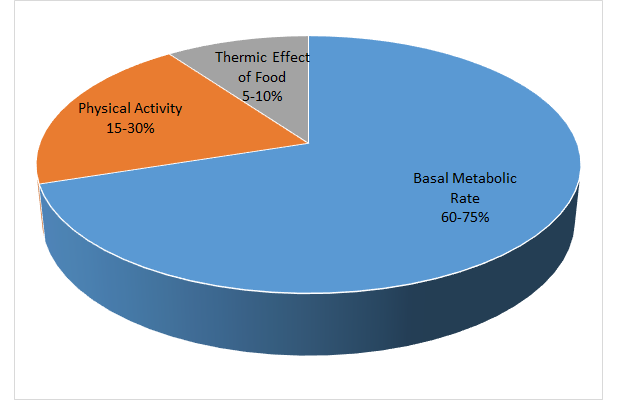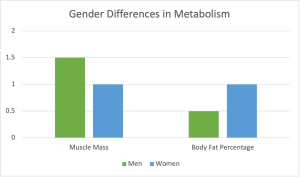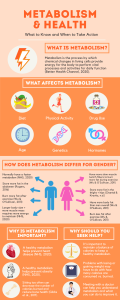Kathryn Root
What is Metabolism?
The human body requires energy to be able to stay alive and do basic daily tasks. This energy can come from food and drink, which includes carbohydrates, proteins, and fats. When food is broken down, the energy from these nutrients is used in chemical reactions to help the body function normally. This process is called metabolism and is made up of two parts: catabolism and anabolism (Better Health Channel, 2020).
How Does Metabolism Work?
The body’s metabolic rate consists of three components: Basal metabolic rate (BMR), thermic effect of food, and energy used during physical activity (Better Health Channel, 2020). BMR burns 50-80% of calories and men tend to use more energy in this part of metabolism. The thermic effect of food is the number of calories required to digest food and uses 5-10% of energy to do so (Better Health Channel, 2020). After eating, the body begins to break down food, generating heat and raising the BMR. During physical activity, the body uses 20% of calories depending on the type and amount of exercise (Better Health Channel, 2020). Calories burned during exercise are the only piece of metabolism that can be controlled depending on the amount of exercise a person does. Therefore, physical activity is important when trying to lose or maintain a healthy weight.

What Factors Affect Metabolism?
According to Better Health Channel (2020), BMR can be influenced by many modifiable and non-modifiable factors. Modifiable factors include diet, drug use, and amount of physical activity. Diet plays a large role in metabolism, but eating foods with less energy can slow down BMR to save energy. During exercise, the muscles in the body use a large amount of energy and may increase in size. More muscle can increase metabolism and cause the body to adapt to burn energy at a faster rate.
Nonmodifiable factors include age, genetics, and hormonal control (Better Health Channel, 2020). As age increases, changes in hormone levels and the brain occur. As a result, the body slowly loses muscle mass and the rate of metabolism decreases. Different genes can affect how much food a person eats. The FTO (Fat Mass and Obesity Associated) gene senses nutrient levels and controls hunger, which may affect weight gain (Goop, n.d.) According to Dr. Sara Gottfried, the PPARG gene creates fat cells, so too much of this gene can cause a person to gain weight (Goop, n.d.). Hormonal disorders in the thyroid gland can also increase or decrease the number of calories burned (Better Health Channel, 2020).
How Does Metabolism Differ Between Men and Women?
When examining the differences in metabolism, men normally have faster ones than women. This is due to their larger body size and muscle mass which requires more energy to maintain (National Health Service [NHS], 2020). However, there are more differences in how men use and store fat and other nutrients in the body. Women tend to have a greater amount of body fat than men even though their energy intake is smaller (Wu & O’Sullivan, 2011). This is because women are better at conserving energy and storing it as fat (Wu & O’Sullivan, 2011). Men store more of their fat in the abdominal area, putting them at a higher risk for diabetes, heart disease, and other conditions (Rogers, 2016). Since women have more slow-muscle twitch fibers, they burn more fat during exercise. However, men burn more fat after exercise possibly because of different hormones (Wu & O’Sullivan, 2011). To learn more about metabolism in men vs. women, click this link: Gender Differences in Metabolism

How Does Metabolism Affect Weight?
In order to maintain a healthy weight, people need to balance the number of calories they consume and burn (Harvard Health Publishing Harvard Medical School, 2015). When people consume less calories and burn more, they can lose weight. However, limiting food can cause the body to slow down metabolism and burn fewer calories over time, making weight loss harder (Harvard Health Publishing Harvard Medical School, 2015).
In order to lose weight and maintain a healthy metabolism, a person should do 3-5 days of moderate to high-intensity exercise per week (Vella & Kravitz, 2002). Moderate-intensity activities include biking, brisk walking, or dancing (National Health Service [NHS], 2019). High-intensity exercises include running, swimming, and sports (NHS, 2019). Women tend to use more fat during lower intensity exercises than men. Therefore, it may be better for men to do higher intensity workouts for a shorter period of time. This can increase the total amount of energy that comes from fat, so more energy is actually used (Vella & Kravitz, 2002). Since muscle burns more calories than fat, strength training can increase muscle and help in weight loss (NHS, 2020).
According to the National Health Service (2020), when people eat and drink more calories than they burn, they can gain weight. Since slow weight gain is better than fast weight gain, people should eat 300 to 500 more calories per day (Cleveland Clinic, 2020). Eating junk food can cause more weight gain in the belly, so foods high in calories and nutrients (i.e. nuts and seeds or lean meats) are better to achieve a healthy weight and prevent disease. Additionally, smaller meals every three to five hours can provide calories without feeling too full (Cleveland Clinic, 2020).
What Are Ways Someone Can Improve Their Metabolism?
A healthy metabolism is key to prevent diseases such as obesity, metabolic syndrome, and cardiovascular disease. According to the National Health Service (2020), 150 minutes of aerobic physical activity a week is the most effective way to boost metabolism. Sitting too often, especially with desk jobs, can burn fewer calories, reduce bone health, and increase the risk for weight gain (Gibbs et al., 2017). Therefore, it’s important to take a few minutes to stand up and move at work. Additionally, less sleep is linked to obesity and can disrupt hormones that help control weight (West, 2018). Poor sleep can increase appetite and disturb circadian rhythm as well (Newsom, 2020). This being said, it’s vital to get a good night’s sleep so metabolism is not disrupted.
Some foods may play a role in improving metabolism. Foods that contain iron, zinc, and selenium can help thyroid function (Petre, 2016). These foods include meats, seafood, and nuts. Protein-rich foods like eggs, milk, and grains can help with enzymes that do vital functions in the body (Petre, 2016). Legumes and pulses like peas also have amino acids that may increase the number of calories burned (Petre, 2016).

Chapter Review Questions
1. What is a way to maintain a healthy metabolism?
A. Exercise regularly
B. Consume less calories
C. Inadequate sleep
D. Take supplements to Improve metabolism
2. Which of the following is NOT a factor that affects metabolism?
A. Diet
B. Drug Use
C. Exercise
D. Time of meals
3. Why do men have a faster metabolism than women?
A. Men have more muscle mass
B. Women have more fast-muscle twitch fibers
C. Men burn more fat during exercise
D. Women require more energy to maintain their metabolism
References
Better Health Channel. (2020, April 30). Metabolism. https://www.betterhealth.vic.gov.au/health/conditionsandtreatments/metabolism#:~:text=Your%20metabolic%20rate%20is%20influenced,physical%20activity%20and%20hormone%20function.
Cleveland Clinic. (2020, September 15). High-calorie foods and snack ideas to gain weight. https://my.clevelandclinic.org/health/articles/16555-snack-ideas-for-weight-gain
Gibbs, B. B., Kowalsky, R. J., Perdomo, S. J., Grier, M. & Jakicic, J. M. (2017). Energy expenditure of deskwork when sitting, standing, or alternating positions. Occupational Medicine, 67(2), 121-127. https://doi.org/10.1093/occmed/kqw115
Goop. How to hack the genes that impact weight loss & metabolism. (n.d.). https://goop.com/wellness/health/how-to-hack-the-genes-that-impact-weight-loss-metabolism/
Harvard Health Publishing Harvard Medical School. (2015, July). Does metabolism matter in weight loss? https://www.health.harvard.edu/diet-and-weight-loss/does-metabolism-matter-in-weight-loss
Mandal, A. (2021, January 21). What is metabolism? News medical life sciences. https://www.news-medical.net/life-sciences/What-is-Metabolism.aspx
Newsom, R. (2020, October 9). Weight loss and sleep. Sleep Foundation. https://www.sleepfoundation.org/physical-health/weight-loss-and-sleep
National Health Service. (2019, October 8). Exercise. https://www.nhs.uk/live-well/exercise/
National Health Service. (2020, October 26). How can I speed up my metabolism? https://www.nhs.uk/live-well/healthy-weight/metabolism-and-weight-loss/
Nuckols, G. (2015, January 11). Gender differences in major markers of metabolic health. Stronger by Science. https://www.strongerbyscience.com/gender-differences-in-training-and-diet/
Petre, A. (2016, November 14). The 12 best foods to boost your metabolism. Healthline. https://www.healthline.com/nutrition/metabolism-boosting-foods#TOC_TITLE_HDR_2
Rogers, J. (2016, January 17). Gender differences in metabolism. Jefferson Regional Medical Center. https://www.jrmc.org/gender-differences-in-metabolism/#:~:text=About%2090%25%20of%20daily%20energy,and%20body%20size%2C%20not%20gender
Vella, C. A. & Kravitz, L. (2002) Gender differences in fat metabolism. IDEA Health and Fitness Source, 20(10), 36-46. https://www.unm.edu/~lkravitz/Article%20folder/genderdifferences.html
West, H. (2018, July 27). 10 easy ways to boost your metabolism (Backed by science). Healthline. https://www.healthline.com/nutrition/10-ways-to-boost-metabolism
Wu, B. N., & O’Sullivan, A. J. (2011). Sex differences in energy metabolism need to be considered with lifestyle modifications in humans. Journal of Nutrition and Metabolism, 2011, 391809. 10.1155/2011/391809
the chemical changes in living cells that provide energy for vital processes and activities
metabolism that releases energy through the breakdown of complex materials (such as proteins or fats) within the organism
part of metabolism that builds larger molecules from smaller molecules
the rate at which heat is given off by an organism at complete rest
of, relating to, or being muscle fiber that contracts slowly especially during sustained physical activity requiring endurance
a syndrome marked by the presence of usually three or more of a group of factors (such as high blood pressure, abdominal obesity, high triglyceride levels, low HDL levels, and high fasting levels of blood sugar) that are linked to increased risk of cardiovascular disease and type 2 diabetes
Exercises such as jogging, rowing, swimming, or cycling, that stimulate and strengthen the heart and lungs, thereby improving the body's use of oxygen.
Physical, mental, and behavioral changes that occur in 24-hour periods or cycles; includes the sleep-wake cycle
an organic molecule that contains an amino group, carboxyl group, and side chain that makes up proteins and are made by living cells
